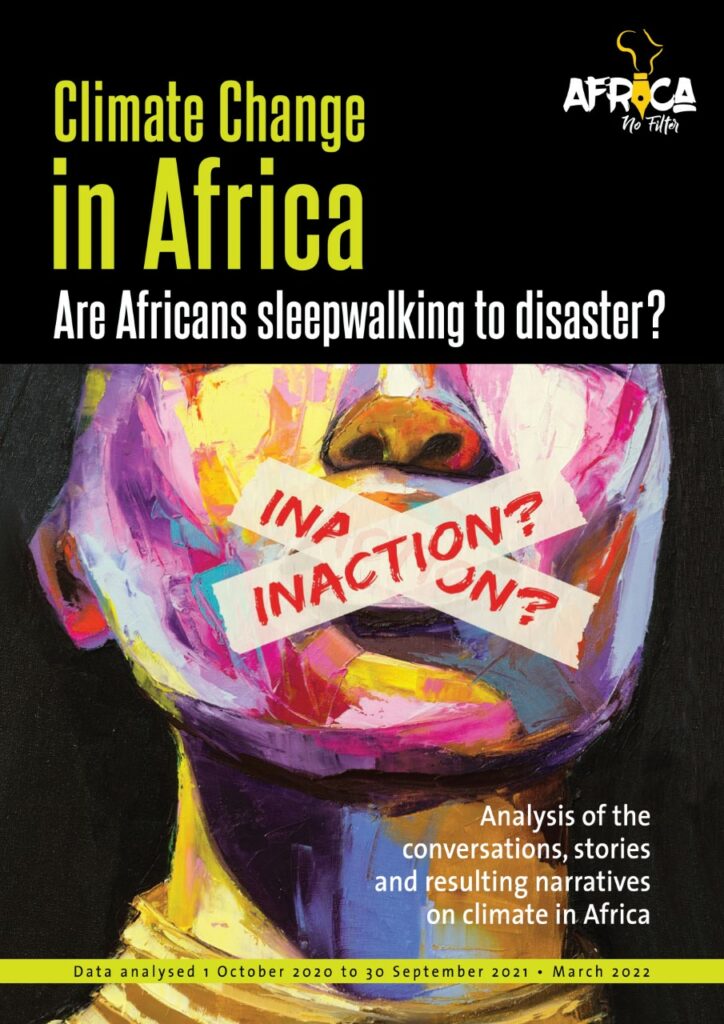CAIRO, Egypt, 21 April 2022 -/African Media Agency(AMA)/- Africa has become the face of the global climate crisis, yet Greta Thunberg has emerged as the continent’s leading voice of advocacy – even among African activists, according to the newly launched report, Climate Change in Africa: Are Africans sleepwalking to disaster?
The research was undertaken by Africa No Filter to understand storytelling about climate change in Africa and establish whether it feeds existing stereotypical narratives about the continent or shows Africans as active agents in global climate action. Insights were gathered using a literature review of academic writing on climate change in Africa, online media and mainstream African news sources, conversations on Twitter, and Google searches between October 2020 and September 2021.

The report shows that Africans are missing from climate news and analysis and that few of the individuals tweeting about climate change in Africa are African. Additionally, out of 41 well-known African climate change activists identified in the report, only 15 were on Twitter, and they seldom tweeted. Those who tweeted more regularly often retweeted Western stories, especially from Greta Thunberg.
Moky Makura, Executive Director at Africa No Filter, said: “There is a perception that Africa’s voice is missing when it comes to climate action discussions, and we wanted to understand why. The report shows that Africans are engaging, but it’s on local instead of global climate issues, and we need to be doing more of both. We need more African activists speaking out, and our leaders need to engage more. That’s the only way to change the dominant narrative about the lack of African action on climate change.”
In addition to Thunberg’s outsized influence on Africa’s climate narrative, the report also found that:
- Top organizations tweeting about climate change in Africa are likely to be NGOs: Both African and international NGOs are tweeting about climate change and Africa, with Climate Story Lab Africa (@CSL_Africa), Future Climate for Africa (FCFA) (@future_climate), and Greenpeace Africa (@Greenpeaceafric) posting a combined 311 tweets.
- Africans do not drive Twitter narratives about Africa and climate change: Top individual tweeters on climate change in Africa are unlikely to be African. Additionally, only three African online media outlets featured in the top 10 platforms that published climate stories. Most stories were being shared by the US-owned news aggregator site, allafrica.com.
- Local climate change events are more dominant than international events in climate news in Africa: Although previous studies have shown that media coverage of climate change increases around big global climate change events, this study found that increased media coverage of climate change in Africa was associated more with local events, which indicates that African climate change events are garnering media attention.
- Narratives about climate change vary from one country to another: Articles about climate change in Madagascar were highly stereotypical and perpetuated disaster narratives, while Ghana had more favorable coverage. The news was evenly split between disaster news and mitigation efforts in Kenya. Coverage of climate change in Nigeria was varied and included activism, government activities, international meetings, and high impact “disaster news”.
- Five countries dominated tweets about African climate change: Kenya, South Africa, Nigeria, Ghana, Uganda, and Madagascar featured prominently in Twitter conversations and mainstream African news sources. This connection points to the ongoing role of mainstream media in defining the African narrative.
- Geopolitical and racial tensions dominate tweets by individuals on climate change in Africa: Many of the tweets about climate change by individuals showed contestation between Africa and the West about who is responsible and who should take action – often with racial components to the tweets. This suggests that a “blame game” is more prevalent than action, and racism is strongly prevalent in the kinds of narratives perpetuated about Africa.
- Disaster tweets dominate: Many of the tweets on climate change in Africa emphasized conflict and disaster – especially famine in Madagascar and fires in Tunisia and Algeria.
Climate Change in Africa: Are Africans sleepwalking to disaster? is the latest research project by narrative-change organization Africa No Filter. It forms part of their work to understand and shift harmful and stereotypical narratives about Africa. The report comes at a crucial time for the continent. Egypt will host COP27 in November, which offers African activists and the media the opportunity to drive narratives that show Africa taking climate action instead of being the continent hit hardest by climate change.
Distributed by African Media Agency on behalf of Africa No Filter.
Research Methodology
The report was compiled using five quantitative data collection methodologies, including Google Trends, Twitter conversations and mainstream African media, to understand climate change questions Africans were concerned about, Twitter conversations Africans were having about climate change and who was driving those conversations. The report also analyzed whether leading African activists had Twitter accounts and their messaging, and the common themes across all data, which investigated content published between 1 October 2020 to 30 September 2021.Inquiries: Lerato@africanofilter.org

